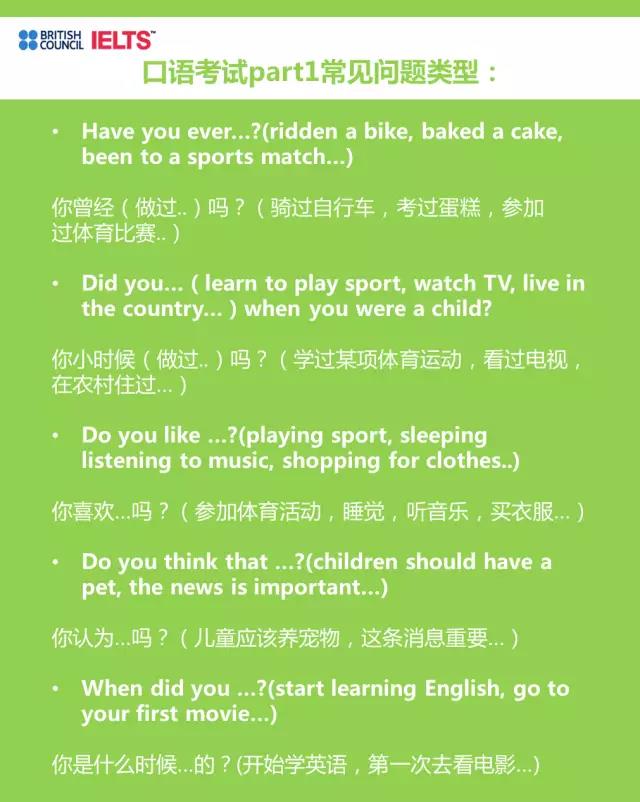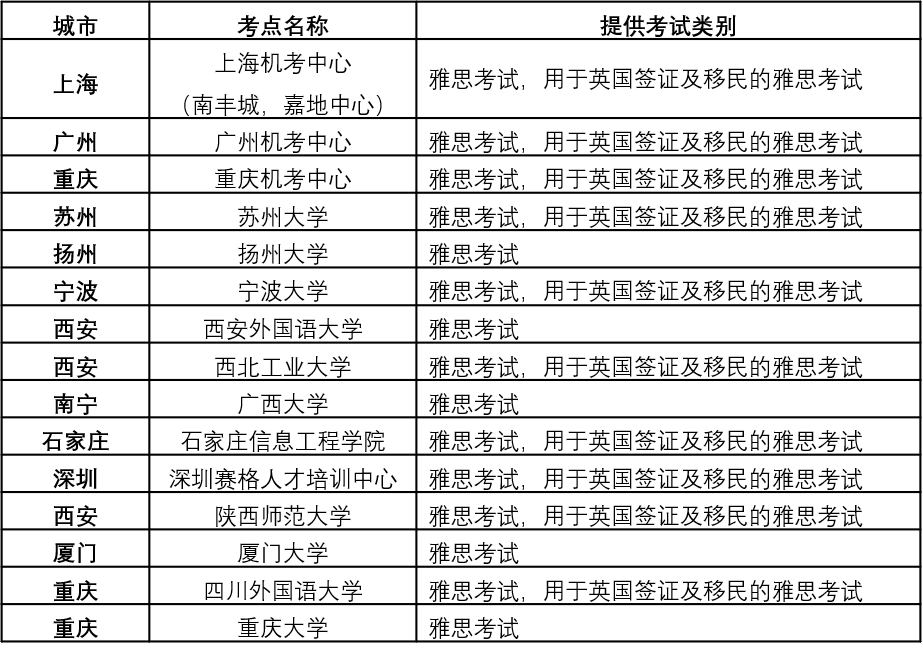雅思口语考试3大黄金法则
雅思口语考试临近,你真的准备好了吗?雅思口语考试现场如何在10分钟内完成高难度的口语尬聊并且打动对面的雅思口语考官?下面小编就和大家分享雅思口语考试3大黄金法则,来欣赏一下吧。
雅思口语考试3大黄金法则
雅思口语考试现场技巧一:转移风险法
顾名思义,就是把回答问题时的风险转移规避出去。在口语考试过程中,时不时会出现怪异刁钻的题目,或者说是自己根本没有准备过并不熟悉的题目。在此情况下考生究竟应该如何应对呢?是坦白的告诉考官自己不会呢?还是不分黑白乱侃一通呢?其实答案是也不是。
在此情况下,考生应该机警的应对,采用风险转移法。以第一部分2006年考到的“鸟”的题目为例。考官问道:“What are the most popular birds in China and what meanings do they have?” 其实先别提大多数考生是否知道在中国流行的鸟究竟有哪些,事实上应该连鸟的英文名字都叫不上来一两个,就更别提他们的含义了。这时候怎么办?总不能不回答问题吧?好办。考生可以坦然地告诉考官:“I don’t really know much about birds.”或者干脆说:“I don’t know.”但是记住,这永远不是问题回答的结束。接下来一定要说“but”。可是but之后又该说什么呢?胡侃瞎侃可以吗?完全可以,但是风险要转嫁出去。考生可以用一个简单的转移技巧:“but one of my friends is crazy about birds, and he used to tell me...” 你看这样子即使考生接下来乱侃一通,考官也不能指责考生,因为这些内容根本就是听别人说的嘛,要怪也要去怪别人吧。
所以说遇到难题不会回答的题,不要着急,一定要镇静。回答时可以侃,但是一定要侃的有理,侃的巧妙。
雅思口语考试现场技巧二:昵称法
所谓昵称法就是给自己所要谈的人或物冠以昵称,以体现考生对英语更灵活的掌握和对问题更巧妙地回答而使之成为一个闪光点。就人来说,考生可以使用Mr., Miss或 Mrs.加上一个人的特点或者直接用一个描述性的名次短语来给一个人昵称。例如:Mr. Handsome 可以指一位相貌出众的帅哥, Mr. Big Nose 可以用来称呼一大鼻子哥们儿, Mr. Determination 可以形容以很有决心的人, Mr. “I don’t know”可以用来称呼凡事总是 “I don’t know”的哥们儿。遇到物品,例如谈一样有用的设备,我就会说“well, I am going to talk about my little girlfriend then…” 考官听到这里刚要纳闷怀疑我是不是没读懂题目,就听到我接着说到“…my iPod, a very trendy mp3 player and also a very useful electronic device, which I would always take along with me wherever I go.”此时,考官就会恍然大悟。“哦,原来这哥们儿在运用修辞,在玩幽默,还把自己的iPod当成了女朋友。呵呵,真是有心了。”当然还有很多其他的例子,考生完全可以充分发挥自己的想象力来使自己的回答更加生动有趣。
雅思口语考试现场技巧三:讲故事法
大多数中国考生要么往往因为自己根本没有思路不知道如何回答考官的问题,要么就是因为英文能力不足,无法用抽象的语言把自己的论证用流畅的正确的英文表达出来。可是话说回来,如果让任何一个考生用英文描述一个故事,应该还是很容易的。大家论证问题不行,讲个故事还是蛮可以的嘛。也就是说,如果考官让考生解释一个想象,阐述一个原因,考生完全可以用讲故事的方法代替。例如,在第二部分就考过describe one important decision的主题卡片。考生要回答这个决定是什么,在什么情况下作出这样的决定,为什么做出这样的决定,以及这个决定为什么重要。假如说我们讲这个重要的决定是去英国读书,有的学生可能就将英国的教育质量如何得好,在英国可以如何的提高英语,还有可以如何的开阔眼界。难道中国的教育质量就不好吗?在国内学习英文就比国外差了吗?去其他国家就不能开阔眼界了吗?从所有这些都看不出去英国去得那么必然。即使有道理,那么用英文又能流利的表达这些意思吗?可是如果采用讲故事的方法不但很容易用英文进行表达,而且也能够用自己真实的(或者是虚构的)经历来说明自己去英国留学是这么的必然。考生可以从自己去机场送女朋友或者男朋友去英国读书开始,描述当时离别时的痛苦因为自己很爱他/她,不能失去他/她,所以自己在那个时候如何promise him/her 无论有多么困难都一定也会去英国陪他/她,不让他/她在那边孤独寂寞。这就从一个侧面反映了自己做出的重要决定以及为什么。这样完全规避了长篇空洞的论述,而能够收到一种以情动人的效果。具体还可以参考一下第二部分重要决定哪个主题卡片的回答与讲解。
2020年9-12月雅思口语part2&3答案解析:被天气阻止的活动
Describe an occasion when weather prevented your activity.
You should say:
when that happened
what you have planned to do
what you did in the end
and explain how you feel about it
There is one occasion that really sticks in my mind. This was when I went to England to stay with a friend of mine. He was a university friend who had gone off to do a master’s degree in Warwick university. Anyway, he had a few foreign friends who were studying Asian studies, English guys. And one of these guys invited us to stay at his parents’ house in the countryside for a weekend. I thought this was a really cool invitation and a really cool experience, so of course I went. I bought some nice cheeses and a few bottles of wine, as I heard they wanted to prepare a sort of buffet lunch and barbecue outside, in the back garden. It was summer you see.
Anyway, we arrived in just a couple of hours (England is small and everywhere seems really near compared to my country) and we chatted to the family, drank cups of tea, had a bit of a rest, then everyone started to help prepare the tables outside, the cutlery, the dishes and things like this. The men got to work on making the barbecue and the women and the girls sat around chatting drinking some white wine, and preparing the table. It was a really lovely garden too - the English seem to have really nice, slightly wild, but beautiful gardens -and I was pretty excited about the whole experience.
Then, suddenly just as we were all about to sit down to eat, the sky opened and it started bucketing down with rain. Really, it was torrential rain and very very sudden. This is the funny thing about England, people even joke that you can experience four seasons in one day in the UK, and I think this is true… one minute it was warm and sunny, then the next minute a dark cloud passed over and it started thrashing down with rain. We all rushed in a panic to get all the main dishes inside before they were spoiled. On the one hand it was pretty funny, as they said I had had a really “authentic British experience”, but on the other hand it was a real shame. However, we did manage to put everything pretty safely onto the dining room table and continue eating and drinking there, so it was okay in the end, and we had a good laugh about it all. Actually, in a way, it did create a nice feeling of bonding between everyone and certainly broke the ice!
Part3
1. Do Chinese people enjoy talking about weather when they meet? Why?
I don’t think so really. I mean, a little bit, but I don’t think they talk about the weather more than anyone else. Certainly, they don’t talk about the weather as much as the British! We might comment about the weather if it’s especially cold – we are a bit sensitive about the cold – or if it’s especially hot or these kind of extremes. But maybe it depends which part of China you are from - it’s a huge country and the weather systems, even climates are radically different from, for example, Harbin, to Sanya… it’s almost like going from one country to another! I’m from Beijing, and we don’t talk about the weather too much here I don’t think.
2. What kinds of weather do Chinese people prefer?
I think it depends. People favour different types of weather. I have friends who like warm or even really hot dry summer weather, others like hot humid summer weather, and others that actually enjoy cold weather – personally I prefer hot weather, but there are people that enjoy a long cold winter. So, honestly it depends. I don’t think we can make a generalization about all Chinese people’s preference in weather!
3. Does weather have any impact on Chinese people’s daily activities? Why?
Yes, of course, like anyone’s daily lives, the weather affects what we choose to do outside, how we get about, whether we go to a park or stay indoors and watch a movie with friends – whether we go to eat at a place with outdoor tables, or go to a warmer place nearer home. Whether we do indoor sports or sports outside. All these kind of things are affected by the weather.
4. What do people do in different weathers?
In summer people get involved in more outdoor activities -and if they live by the seaside they might spend time on the beach or do water sports. In winter people stay indoors more, play indoor games or just watch TV. It depends really…
2020年9-12月雅思口语part2&3答案:作为团队成员的经历
Describe an experience when you were as a member of a team.
You should say:
when it was
who you were working with in the team
what you did in the team
and explain how you felt about the teamwork
I’d like to talk about a time when I participated in a team project in history class. It was when I was in middle school. The teacher divided the class into several groups and set us the task of choosing an event, time or a period in history that we found interesting, then make a presentation about it. We had one week to prepare our presentations, in our free time outside class, and we were told to use pictures, images and any other visual aids or multimedia we wanted. My team consisted of me and three other girls. We chose the period of the Roman occupation of Britain, and we decided to talk about the time when the Romans were flourishing, when their societies in Britain were advanced, and their cities developed – at least for their time, the Roman civilization was the most advanced in the world. You see, the Romans were incredibly advanced for their time, in many ways. We talked about the Roman baths in the city of Bath, and the hot springs that the romans found there. I enjoyed working with the other team members and as a group we decided who would do what tasks to contribute. I was the best at art, so I drew pictures of the goddess of the hot springs and found facts, images and photos of the architectural design of the baths. My colleague, Liu Wei was really good at writing in an informative, engaging and amusing way, so he wrote the description of the building of the famous baths, and my other two colleagues did most of the research in the local library and online about the mythology surrounding the goddess and the hot springs. On the appointed day, we did the presentation in front of the class, and each took turns to talk about a different aspect of the roman baths. It was very well organised, informative and quite funny in places. I found it was a great success and the teacher was very happy with it, and the rest of the class seemed to find it entertaining. I also think that we learned about how to distribute the different tasks in a way that was fair and used each person’s personal talents and abilities to the maximum. We were also quite patient while preparing the presentation, even when we didn’t really agree upon certain things. So, I think these kind of projects are very useful for children to take part in, and an important part of education.
Part3
1. Do you think it is important for children to have experience as part of a team?
Yes, I think it’s very important that children learn about teamwork and how to work with other people as a team – when we work in teams we learn the skills of cooperation, patience, listening to other ways of doing things and considering other people’s points of views and perspectives on how to do something. All of these skills are very important for their future life and getting along with others in society, as well as for working with others in adult life, in the working world.
2. What do you think is the most important quality to be a good team member?
A good team member is tolerant, patient, understanding of other people’s perspectives and opinions, but also able to clearly and honestly express their own opinions, with diplomacy when necessary.
3. Would disagreement bring heavy impact to a team?
Disagreement shouldn’t really be a bad thing if it is expressed and handled maturely. There are ways to express disagreement politely and it’s best that team members learn to talk to others without losing respect even when we disagree. Sometimes, we must also bear in mind that people get passionate and expressive and sometimes their emotions come out too strongly – we must also try to be patient and understanding when others lose their patience or temper and try to deal with it diplomatically and calmly. If we deal with disagreement in a positive and constructive manner, it shouldn’t be a bad thing.
雅思口语相关文章:
★ 2020年雅思口语题库汇总新题
★ 《老友记》口语笔记第1季:10集
★ 学习资料库
★ 雅思口语Part2攻略
★ 雅思口语备考绝招
★ 雅思口语的DosandDON’Ts详解
★ 雅思口语高分技巧之题目迁移
★ 雅思口语3分~8分距离有多远
★ 雅思口语能力判断依据
★ 雅思口语7分经验分享
本站部分文章来自网络或用户投稿。涉及到的言论观点不代表本站立场。阅读前请查看【免责声明】发布者:天下,如若本篇文章侵犯了原著者的合法权益,可联系我们进行处理。本文链接:/yyzl/xxff/5956.html




